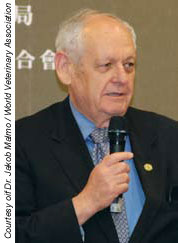World Veterinary Association president offers inside look

Dr. Leon H. Russell has traveled practically to the ends of the Earth as president of the World Veterinary Association. But he'll complete his three-year term on his native continent in late July at the World Veterinary Congress in Vancouver, British Columbia.
Dr. Russell, a professor at Texas A&M University College of Veterinary Medicine and Biomedical Sciences when he's at home, took time between trips to talk about his experiences as WVA president.
During your tenure, what were some of the WVA's notable accomplishments?
The WVA has made progress in addressing animal welfare. We have an animal welfare network on our Web site, www.worldvet.org. We've promoted programs on animal welfare at meetings of other organizations, such as the Federation of Asian Veterinary Associations.
I think we've increased the stature of World Veterinary Day. This year, the WVA and World Organization for Animal Health (OIE) established an award for the most outstanding celebration by a national veterinary association. We will present the award at the World Veterinary Congress.
To improve communications, the WVA started a quarterly newsletter. We had no written communication with the world other than the Web site, and I think this newsletter has been successful.
We also looked at our governance. One goal is to strengthen our secretariat, currently the Danish Veterinary Association. The secretariat primarily keeps our records, but we want the secretariat to be more involved in promoting the WVA and helping us create public policy.
What are examples of how the WVA is influencing international standards for veterinary curricula and other standards relevant to veterinarians?
We're trying to help raise standards of veterinary schools throughout the world. We've been promoting our booklet of educational guidelines, and it has been adopted by the Arab Association of Veterinary Medical Faculties. It really doesn't set standards, but guidelines—such as the need to have courses in various subjects.
The WVA also is the only nongovernmental organization that represents veterinary medicine with the Codex Alimentarius Commission, which the United Nations Food and Agriculture Organization and the World Health Organization founded to develop international food standards.
And we've been involved in international discussions on how to handle antimicrobial resistance. Last November, we participated in the Joint FAO/WHO/OIE Expert Meeting on Critically Important Antimicrobials.
What were some of your more recent or memorable trips as WVA president?
I met with the partnership for World Rabies Day recently in Italy, and I'm very enthusiastic about the projects to promote rabies vaccination. The projects are important because, while rabies is preventable, thousands of people die from the disease each year.
I also attended the International Military Veterinary Medical Symposium recently in Germany. It's inspiring what our young U.S. Army veterinarians are doing throughout the world for mankind, improving food safety and zoonoses control.
Last year, I was in Egypt when the country had an outbreak of avian influenza. The veterinarians had to not only do the animal health work but also disinfect truck tires and dispose of carcasses. They're trying to control the disease as well as possible.
Veterinarians throughout the world are all great people, just like a fraternity. There's a lot of collegiality, and we all have similar problems.
What are the major problems facing veterinarians worldwide? Has the WVA finished writing a new global veterinary oath?
Food safety and zoonoses are tremendous problems, along with animal welfare. The one-health initiative is very appropriate. In some countries, the ministry of health and ministry of animal health just do not see eye to eye.
The WVA has a global veterinary oath from 1995, and we've tried to update it, but some countries don't agree on what is ethical. A country's culture and resources can make a tremendous difference in approaches to animal welfare and disease control.
Rabies control programs in some parts of the world can't afford euthanasia chemicals for dogs, for example, so they turn to cruder methods. Culture also influences rabies control programs. In Africa, people will bring their dogs in to vaccination clinics. In parts of Asia, however, people won't bring dogs to vaccination clinics because they regard the animals as belonging to the community.
What will be the highlights of the 2008 World Veterinary Congress?
The OIE is going to be very much involved throughout the meeting, which I think is exciting. The opening program is "One World—One Medicine—One Health." The rest of the meeting is divided into tracks on public practice and private practice. We'll have more than we've had in the past related to private practice—not only small animal but also food animal and equine practice.
Maybe the most exciting thing is that Vancouver's a beautiful place. People who go will really enjoy the venue as well as the collegiality and the education.